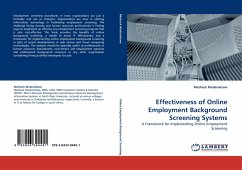Since Max Weber, scholars have been trying to understand the mechanisms affecting worker motivation. Various negative and positive reinforcement has been tried from Theory X and Theory Y to Maslow's Theory Z. Yet worker productivity varies greatly and managers are often frustrated by their inability to get more work from workers. Scholars have published a great variety of theory and there have been calls for an overarching construct to unify all of those theories. None have been forthcoming. A solution may lie in open systems theory - recognition that all of the theories are bound and subject to the principles of open systems theory as described by Skyttner, von Bertalanffy, and Laszlo. This book examines open systems theory principles and describes how they apply in organizations. In addition, a case study shows how these principles came into play such that workers broke production records in a U.S. manufacturing plant.
Bitte wählen Sie Ihr Anliegen aus.
Rechnungen
Retourenschein anfordern
Bestellstatus
Storno








